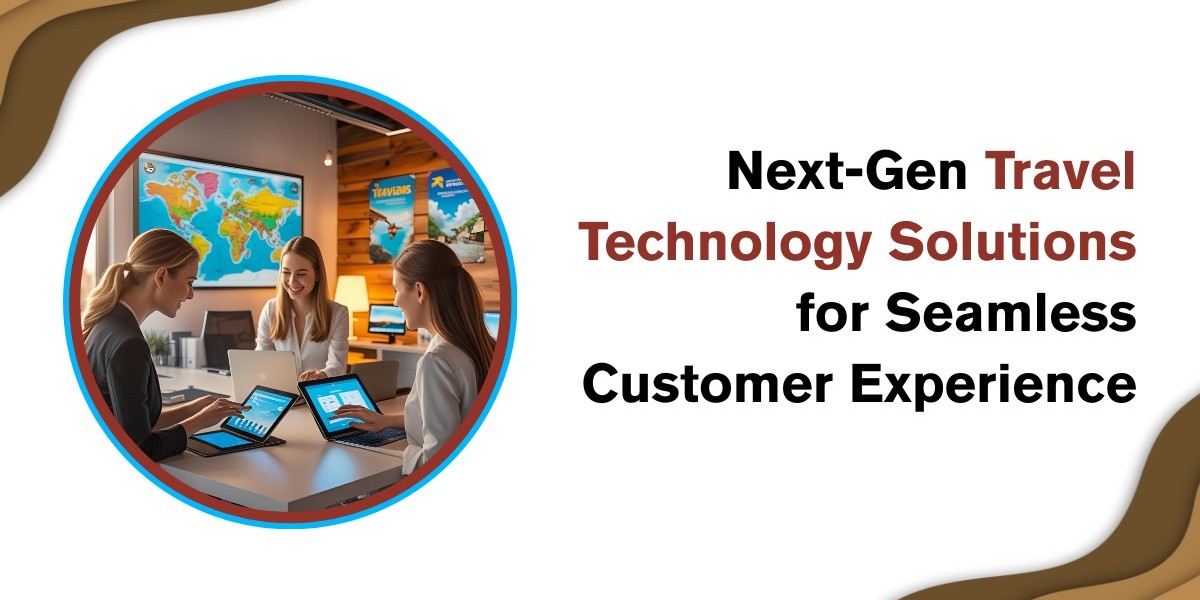The travel industry has experienced rapid changes due to technological innovation. Travel companies now face growing pressure to meet rising customer expectations while reducing operational challenges. Traditional systems no longer suffice in delivering fast, flexible, and accurate service. Next-generation travel technology solutions offer the infrastructure and intelligence required to serve today’s digital-first travelers.
By using modern tools and platforms, a travel technology company can help improve personalization, booking speed, customer support, and data accuracy.
What Are Travel Technology Solutions?
Travel technology solutions refer to digital systems designed to support and enhance travel-related operations. These tools improve various stages of the customer journey—from trip planning to post-travel feedback. Solutions often combine booking engines, data analytics, mobile apps, AI-based assistants, and cloud infrastructure.
A travel technology company typically builds and integrates these solutions for airlines, hotel chains, travel agencies, car rental firms, and tour operators. The aim is to optimize user experience, increase operational efficiency, and enable better data control.
Why Next-Gen Technology Matters in Travel
1. Growing Customer Expectations
Modern travelers expect speed, convenience, and personalization. They want instant confirmations, real-time updates, and accurate recommendations. Any delay, system lag, or outdated interface can lead to frustration. Poor user experience often results in negative reviews and customer churn. Travelers compare options quickly, so even small issues can cause business loss.
2. Complex Supply Chains in Travel
Travel services come from many suppliers. Flights, hotels, rental cars, and local experiences operate on separate systems. Bringing them together is a challenge. A centralized platform is needed to manage data from these sources. Without integration, errors like overbooking or mismatched itineraries can occur. Automation and system compatibility reduce these risks.
3. The Role of Data in Travel Decisions
Customer data shows preferences, behavior, and buying patterns. This data is valuable for building better services and offers. But raw data alone has little use. Companies must apply analytics tools to uncover patterns and insights. These insights support smarter decisions—like adjusting prices, targeting promotions, or creating new travel packages. Without analysis tools, growth opportunities are missed.
Key Technologies Driving Seamless Travel Experiences
1. Artificial Intelligence (AI)
AI improves service delivery by analyzing customer behavior, automating tasks, and predicting preferences.
Applications:
Smart chatbots for 24/7 support
Dynamic pricing engines
Personalized trip recommendations
Fraud detection in payments
For example, a travel website can use AI to offer real-time trip packages based on browsing history, location, and budget.
2. Internet of Things (IoT)
IoT devices collect and share data across physical and digital platforms.
Examples:
Smart hotel rooms that adjust lighting and temperature automatically
Real-time luggage tracking systems
Sensors at airports for crowd control and passenger flow management
IoT helps reduce uncertainty and improves convenience for both customers and operators.
3. Cloud-Based Booking Systems
Cloud platforms support real-time processing, scalability, and high uptime.
Benefits:
Global data access from any device
Easy integration with payment gateways and APIs
Secure backup and failover features
Modern travel booking engines rely on cloud infrastructure to handle high traffic during peak travel seasons.
4. Machine Learning for Predictive Insights
Machine learning models use historical and real-time data to forecast trends and recommend actions.
Use Cases:
Forecasting demand for flights and hotel rooms
Identifying high-risk travelers or transactions
Customizing loyalty offers
Predictive models help companies adjust inventory and pricing before problems arise.
5. Biometric Identification
Biometric tools enhance safety and reduce wait times.
Applications:
Facial recognition at airport gates
Fingerprint-based hotel room access
Voice recognition for customer support calls
These systems make travel secure and convenient, especially for frequent flyers.
6. Augmented Reality (AR)
AR overlays digital content in the real world.
Use Cases:
Airport or hotel navigation through smartphones
Interactive tourist guides
Pre-booking hotel walkthroughs
AR helps customers understand services better before purchase.
Benefits of Next-Gen Travel Technology Solutions
Faster Service Delivery: Automation and real-time processing reduce waiting time across touchpoints.
Better Personalization: Tailored recommendations improve booking conversions and customer retention.
Lower Operating Costs: Cloud-based systems reduce infrastructure overhead and manual labor.
Improved Accuracy: Real-time data helps avoid double bookings, lost reservations, and missed connections.
Increased Transparency: Customers get clear details on policies, availability, and pricing.
Real-World Examples of Technology Success
1. Airline Sector
An airline introduced AI-powered chatbots that resolved 70% of customer queries without human help. This reduced call center costs and improved response time to under 10 seconds.
2. Hotel Chain
A major hotel group implemented IoT-enabled smart rooms. Guest satisfaction scores rose by 25% due to improved comfort and faster service.
3. Online Travel Agency
An agency deployed machine learning to predict customer preferences. It resulted in a 30% increase in cross-sell revenue by offering custom tour packages.
Key Metrics That Support Travel Technology Investments
90% of travelers expect a self-service booking experience.
Mobile bookings account for over 50% of travel reservations globally.
Travel companies using AI reported up to 25% savings in operating costs.
Real-time data analytics improves inventory planning accuracy by 35%.
Companies using predictive pricing tools saw an average of 20% improvement in revenue.
Technical Considerations When Adopting Travel Technology
1. System Integration
Solutions must work with existing booking engines, CRM systems, and payment platforms. API-based designs help ensure smooth data flow between systems.
2. Security and Compliance
Handling sensitive data requires encryption, multi-factor authentication, and compliance with standards such as PCI DSS and GDPR.
3. Performance and Scalability
Systems must handle spikes in demand during holiday seasons. Load testing and cloud autoscaling play a vital role in uptime and response speed.
4. User Interface (UI)
A clean, intuitive UI increases conversion rates and reduces training time for employees.
Challenges in Travel Tech Adoption
1. High Initial Costs
Developing and deploying systems like AI chatbots or biometric tools may require significant capital investment.
2. Data Silos
Travel businesses often store customer, supplier, and booking data across separate systems. This fragmentation limits the effectiveness of analytics.
3. Change Management
Employees need training to use new tools. Poor onboarding can lead to slow adoption and reduced ROI.
4. Privacy Concerns
Collecting biometric and behavioral data raises ethical concerns. Travel technology companies must offer opt-out options and follow strict data governance.
Future Trends in Travel Technology
1. Voice-Based Search and Booking
Voice assistants are gaining popularity across devices. Travelers can now search for flights, hotels, or rental cars using simple voice commands. This hands-free method is efficient, especially while multitasking. As natural language processing improves, voice booking is likely to become a standard feature in travel apps and platforms.
2. Real-Time Translation Tools
Communication is a major challenge in international travel. AI-powered translation tools are solving this issue in real time. Mobile apps can now translate signs, menus, or conversations instantly. This helps travelers interact with locals without language barriers. It also improves safety and comfort in unfamiliar environments.
3. Rise of Contactless Travel
The pandemic changed how travelers think about touchpoints. Contactless systems are now preferred for hygiene and convenience. These include mobile boarding passes, digital hotel keys, and tap-to-pay options. Face recognition at security checkpoints and biometric check-ins are also growing. These systems reduce wait times and increase customer satisfaction.
4. Autonomous Vehicles in Travel Spaces
Self-driving vehicles are starting to appear in controlled environments like airports and resorts. These include autonomous luggage carriers, shuttle buses, and room service robots. They offer safe, reliable service without human drivers. As regulation and testing expand, their role in travel operations will grow significantly.
Conclusion
The travel industry must adapt to serve more informed, digital-first customers. Next-gen travel technology solutions offer powerful ways to meet this need. From AI personalization and IoT automation to cloud platforms and real-time analytics, the tools are ready. A travel technology company that invests in these systems will not only increase operational efficiency but also deliver seamless, satisfying customer experiences.
Organizations that fail to adopt these changes risk falling behind in an industry where convenience, speed, and accuracy define customer loyalty. Now is the time to take the next step in travel technology evolution.







